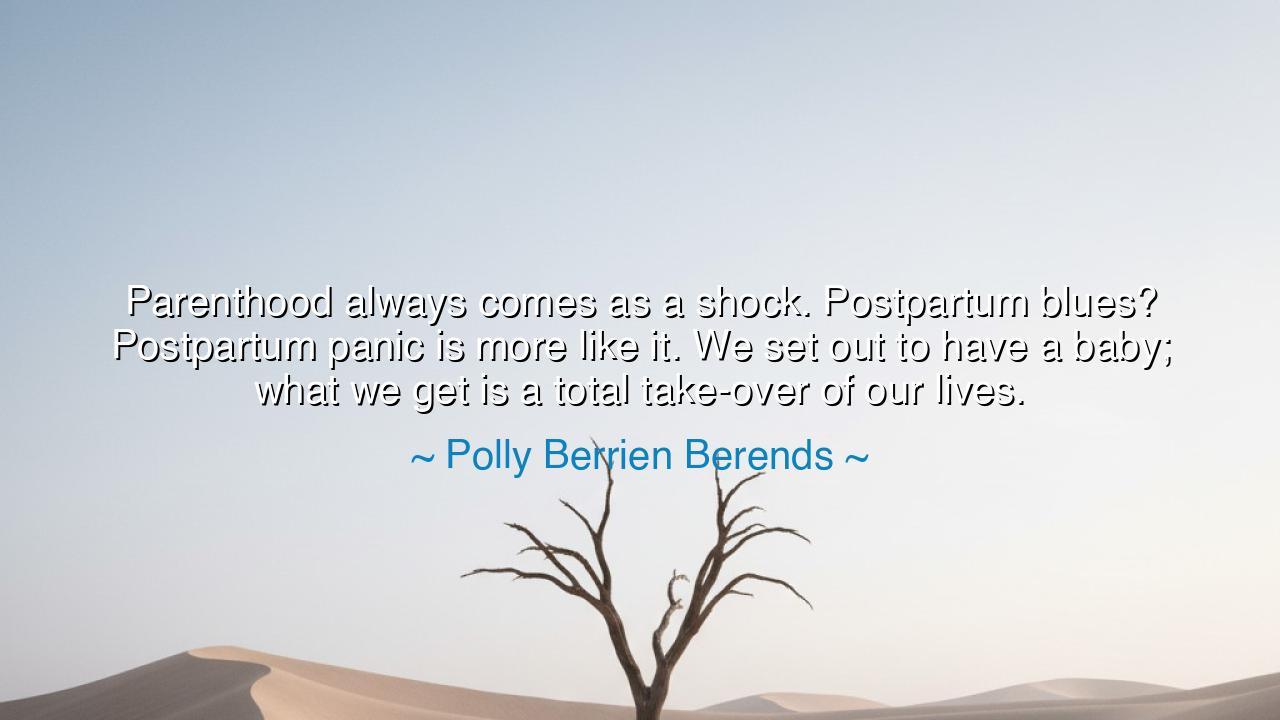
Parenthood always comes as a shock. Postpartum blues? Postpartum
Parenthood always comes as a shock. Postpartum blues? Postpartum panic is more like it. We set out to have a baby; what we get is a total take-over of our lives.






The words of Polly Berrien Berends—“Parenthood always comes as a shock. Postpartum blues? Postpartum panic is more like it. We set out to have a baby; what we get is a total take-over of our lives.”—speak with the raw honesty of one who has walked through the fire of new beginnings. They tear away the veil of sentimental expectation and reveal the truth that parenthood is not a gentle unfolding, but an upheaval, a sudden reordering of life’s every rhythm. In this, Berends captures both the terror and the majesty of bringing forth new life: it is not the delicate addition of a child to one’s world, but the transformation of the world itself.
The ancients understood that every great transition begins with shock. The soldier entering his first battle, the sailor meeting his first storm, the monarch ascending the throne—all are overwhelmed by a force greater than they had imagined. So it is with parenthood: no book, no counsel, no dream can prepare the heart for the storm that follows birth. The infant is small, but its presence is mighty. It commands without speaking, it disrupts without intent, and it reshapes its parents’ days and nights with the gravity of a new sun rising in their universe.
Consider the tale of Queen Victoria, who wrote in her journals of the profound disarray she felt after the birth of her first child. Though a queen with servants and wealth, she confessed to a sense of helplessness and panic, as though she had been thrust into a role she did not yet know how to play. This confession echoes Berends’ words: the shock of parenthood is universal, cutting across rank and privilege. It is not the resources one holds but the sudden realization that life has been overtaken by a power that demands everything.
Berends’ contrast between “postpartum blues” and “postpartum panic” is not mere exaggeration. It speaks to the overwhelming reality that caring for a newborn is not simply an emotional dip, but a total reordering of the self. Parents must abandon their old lives—their sleep, their freedom, their illusions of control—and step into a realm where their every action is bound to the needs of another. In this surrender lies both suffering and glory, for through it they learn the deepest meaning of sacrifice.
Yet within the shock is also a hidden gift. The total takeover is not destruction, but transformation. The parent who once measured time by their own desires now measures it by love. The freedom that seems lost is replaced by a new freedom: the freedom of devotion, of finding purpose beyond the self. The panic gives way, slowly and painfully, to wisdom. Thus, the shock of parenthood is like the hammer striking raw metal—it shatters comfort, but it also forges greatness.
The lesson for us is this: expect the shock, and embrace it. Do not cling to the illusion that life will continue as before, for in that clinging lies despair. Accept that the arrival of a child will break your patterns, overturn your expectations, and demand more than you imagined possible. Yet know also that this breaking is the very making of you—that in giving up the life you once had, you gain a life richer, deeper, and more enduring.
Therefore, let your actions be these: prepare not for balance, but for upheaval. Speak honestly with others about the chaos of new parenthood, so that none suffer in silence. Support those who are newly parents, not with judgment but with compassion. And when the panic comes, as it surely will, remember that it is the sign of a sacred transformation, not of failure.
Thus, Polly Berrien Berends’ words endure as a torch of truth: parenthood is a shock, but within the shock lies the seed of wisdom. What begins in panic can grow into strength, what begins in upheaval can end in love. Let this wisdom be carried forward: that those who walk through the fire of new beginnings, though shaken and remade, emerge as greater vessels of love, guardians of life itself.






AAdministratorAdministrator
Welcome, honored guests. Please leave a comment, we will respond soon